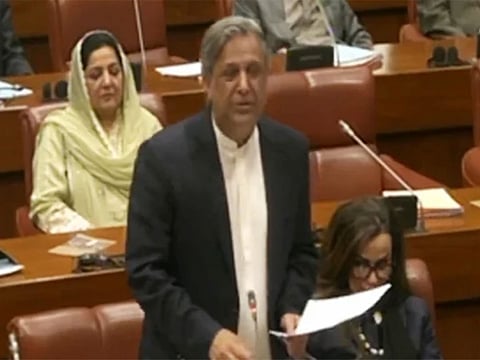Pakistan Senate approves 27th Amendment Bill
Opposition walks out as Senate clears 27th Amendment; bill heads to National Assembly

Dubai: The Senate of Pakistan on Monday passed the 27th Constitutional Amendment Bill, a landmark piece of legislation proposing sweeping judicial and military reforms, amid protests and a walkout by opposition lawmakers.
According to Pakistani media reports, including Dawn and Geo News, the bill was approved after 64 members voted in favour — achieving the required two-thirds majority in the 96-member Upper House. No votes were cast against the bill as the opposition benches boycotted the division, paving the way for its smooth passage.
The bill, tabled by Law Minister Azam Nazeer Tarar, seeks to establish a Federal Constitutional Court (FCC) to adjudicate constitutional matters and relieve the Supreme Court’s growing backlog of petitions. The amendment also introduces changes to the Judicial Commission of Pakistan (JCP) and clarifies administrative provisions under Article 243 concerning the armed forces.
Senate Chairman Syed Yousaf Raza Gilani presided over the session, which began with a clause-by-clause voting process followed by a formal division vote. Opposition members chanted slogans, tore up copies of the bill, and walked out before the final count.
What's in the bill?
New position, Chief of Defence Forces, will be created as head of armed forces — effective from November 27, 2025
Chief of Army Staff to assume role as Chief of Defence Forces
Field Marshal, Marshal of Air Force, Admiral of Fleet titles to remain for life
Federal Constitutional Court to be established
President and prime minister to play a key role in judicial appointments
Supreme Court powers to be reduced, with some authorities shifted to the new court
Before the vote, the joint parliamentary committee on law and justice — comprising members of both Houses — had examined the bill and approved it with minor amendments.
The opposition boycotted the committee’s deliberations. Presenting the committee’s report, Senator Farooq H. Naek, Chairman of the Senate Standing Committee on Law and Justice, said the body had held two days of discussions and made “many changes” to the initial draft.
According to Geo News, the most notable amendment approved by the committee was the creation of the Federal Constitutional Court, which will have equal representation from all provinces and include a judge from the Islamabad High Court. The eligibility criteria for judges were revised — requiring five years of high-court service instead of seven — to expand the pool of qualified candidates.
Naek added that the FCC would retain suo motu powers, but these could only be exercised upon receiving an application, and not unilaterally. He explained that this mechanism aimed to balance judicial independence with procedural checks.
Judicial transfers
Dawn reported that the amendment also changes the process of judicial transfers: A high-court judge may now be transferred to another province through the Judicial Commission of Pakistan, which includes representation from parliament, the executive, civil society, and the bar.
The committee further recommended that interim stay orders in revenue cases automatically lapse after one year if no verdict is reached, a move intended to reduce case backlogs. Additionally, the speaker of the National Assembly will now be authorised to nominate a woman, non-Muslim, or technocrat as a member of the JCP.
Law Minister Tarar said the amendment reflects long-standing proposals from political parties and bar councils to modernise the constitutional framework and ensure specialised adjudication of constitutional questions.
“The establishment of the Federal Constitutional Court will allow the Supreme Court to focus on its appellate jurisdiction and help ensure the timely resolution of civil and criminal cases,” he told lawmakers.
The 59-clause bill will now be presented to the National Assembly for voting. Once approved, it will mark one of Pakistan’s most significant constitutional reforms in recent years, with implications for both the judiciary and governance systems.

![Judgment holds local arm of international tech company legally responsible. [Illustrative image]](http://media.assettype.com/gulfnews%2F2026-03-02%2Fnh2vujch%2F202509173512728.jpg?w=320&auto=format%2Ccompress&fit=max)


